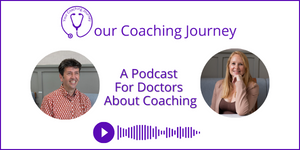Prefer to listen?
This blog post forms the basis of a podcast on our new coaching model, which you can listen to here.
For most people coming to coaching and thinking of getting involved in coaching as a profession, they probably have the idea that goals is very much an integral part of coaching.
And many people do utilise coaching in order to achieve a goal. When you’re learning how to coach you’ve got to start somewhere, and goals aren’t a bad place to start. However, in terms of both of our coaching approaches, and the way that we train people, we’re more interested in transformational change, which is not about aiming for specific goals as such.
We will work with goals if that’s what the client wishes to do, but it isn’t necessary for them to have a specific goal in order to benefit from coaching.
Let’s think about the terminology.
Our coachees will have desired objectives or outcomes that they would like to see as a result of coaching. We will work with those desired objectives. We’ll be looking to help faciliate their thinking around the change they want to see. And you might refer to that change as a goal, but we prefer not to use the word.
We can, and often do, work with specific goals, helping a coachee to break down their goals in to actionable steps and work towards them, if that’s what they want to do. But we know that coaching can be about much more than that. There’s so much more that goes on in someone’s mind, in their thinking, and there are so many other challenges in the world and in people’s lives that if they think a coach is all about goals, then they may be missing out. If they’re looking to have a space to think, they need to know that coaching is not all about goals.
Organisations are where goals tend to come up for people in coaching and if we track that back historically, organisations would have been looking for a coach to help with the performance of individuals within their businesses. And if we think about the figurehead of coaching in the last century, John Whitmore, who wrote the book, ‘Coaching for Performance’, he was heavily involved in introducing coaching, certainly in the UK and also in America. He brought aspects of sport into coaching, but also the business management consultancy side of things, and almost merged the two. He also developed the G.R.O.W. model which is often used (and we used to teach) in coaching.
The G.R.O.W. model is:
- what’s the goal?
- what’s your current reality?
- what options have you got to move forward and how will you do it?
- what’s the way forward?
The G.R.O.W. model is very much the starting point for most people when they come to coaching, and obviously goals is at the forefront of that. It’s the main thing that people are working on.
When people think about John Whitmore and ‘Coaching for Performance’, they think of G.R.O.W. and they think of goals. But actually, if you go back to that book, at the end it, John Whitmore actually moves past goals and starts to talk about transformational coaching. Most people aren’t aware that he had a different way of being, he started to talk about identity, spirituality, sub-personalities, inner wisdom,, and personal growth. In the development of his coaching he completely moved away from the G.R.O.W. model and the pursuit of goals.
And maybe that’s the evolution many coaches go through too, from goal-focussed at the start, and with experience and as you develop as a coach, it becomes more nuanced as you start to work with the person in front of you and all of the complexity that they bring to coaching.
What Coaching Model Do We Use?
We’ve now created our own model, TOM’S CODE, and whereas G.R.O.W starts with ‘G’ for GOAL, our model starts with ‘T’ for TOPIC, then ‘O’ for the OUTCOME. You can see already that this is much broader and as we go through that model, it’s much more nuanced than G.R.O.W.
You can find out more about TOM’s CODE in our previous blog, or in our podcast here.
Often in those conversations about topic and outcome, the coachee might want to have some clarity. And it could perhaps be argued that this is their goal, but we don’t really like that word as a guide. It feels like we’re pushing someone to get somewhere fast. And, actually, within our coaching, we like to have lots of lovely space for people to think and generate new thinking. So, perhaps using the term ‘goal’ is a little unhelpful in that respect.
Thinking About The Future In Coaching
Coaching and most coaching approaches, are future focused, and it does make sense to have an idea of where you’re heading. And some people will have a specific goal in mind and come to coaching because they need to work out how to get there. If that’s the case, it’s possible that we might be off and running and without stopping and checking certain elements about that goal. Maybe they haven’t stopped to think about what impact it’s going to have on them, their family, or the people around them. So, even with a goal in mind, we think that it’s useful if there is some more thinking before we head off in its pursuit.
The danger is that it all happens too fast; throw out some options, choose one, plan it, do it. We might need to slow it down a bit and get people to really think about the direction they’re heading in and what they really want in life. And there is some evidence for this in neuroscience.
Neuroscience and Goals
There’s very limited neuroscience research around coaching, however we have come across one small study where fMRI scanning was used. It looked at the effects of coaching where one group of people were coached so that they focussed on their goal straight away, and the other group did some visioning and considered how they want their life to be in the future, (which is more useful in generating new thinking). They found that the second group engaged the parts of the brain that are going to be more creative and more reflective.
So even when goals are involved, taking to time think about things more deeply, and then do the action focussed part later, can be really beneficial.
On our Transformational Coaching Programmes we’re very much concerned about that transformational change, looking at the future, encouraging people to really generate some new thinking and not going straight to goals too quickly and just being focused on how are they are going to achieve those goals as quickly as possible.
Coaching For Goals Within Organisations
If we’ve got organisations that are interested in someone just performing more effectively and being who they want them to be, which might be asking them to be different, you are going to get involved with goals.
When we take a more holistic view to the person sitting in front of us, not doing coaching to them, but sitting with them, exploring their world with them, we think we can work with the individual and who they really are. That that leads to much better outcomes for everyone involved.
Coaching provides such a perfect space to reflect and really get underneath why we want to do what we want to do, before we even consider the how and when.
Coaching is also a space to be heard and to hear your own thinking back, which can be revelatory. And that’s not about goals either, that’s more about understanding yourself better.
Additionally, when we remove the need for a specific goal, we can also remove the need for new coaches to think they have to fix a problem or bring the solution. This is something that many new coaches find challenging, especially our doctors; they’re used to fixing people, which we love them for. We don’t want them to be any other way when they’re a doctor. But when they come into that coaching space initially, one of the hardest things to unlearn is that need to fix and solve a problem. And if we remove the requirement for a goal and think about it as a thinking space, then hopefully it helps them to take themselves and their problem solving out of the equation and simply coach.
If we go back to our original question: Do we need to have a goal in coaching?
We don’t think so. We think coaching is much more interesting than that and if people are put off coming to coaching because they don’t have a specific goal, then we would reassure them that that’s not necessary. Desired objectives will come up in coaching as you start to sort out what’s going on for you and what you want for your future.
And, if someone does have a goal that they want to bring to coaching, bring it, but then be prepared for your own evolution. In the same way that we said, coaches evolve as they move away from being goal focused, our coachees evolve as we open up that conversation. You might come initially with a goal and say, ‘this is what I want to achieve’, but it’s good to check that it is indeed your goal, and not someone else’s. And then be curious, sit with your thinking and see where it takes you, because that could be life changing.
For any new coaches out there who are concerned when someone comes to a coaching session and they’ve not got a goal in mind straight away, don’t worry too much about that. Be ready to sit with them in curiosity and just explore what’s going on in their life and that future vision for themselves. Some goals will emerge somewhere along the line, and they will probably be more interesting goals.
And hopefully we’ve reassured someone who is thinking, ‘Do I want coaching?’, that it isn’t all about the goals. Someone is going to sit with you for a specific amount of time and listen and allow you to think and talk through your thoughts. And hopefully this will encourage some people to come to coaching who perhaps haven’t been before.
To find out more about our Doctors’ Transformational Coaching Diploma click through here



